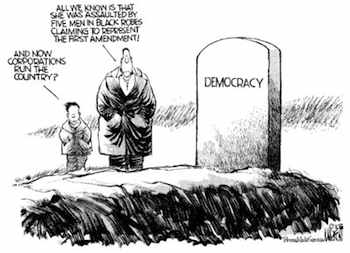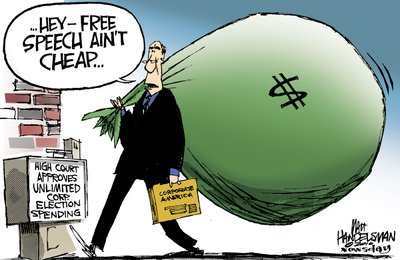- MENU
- HOME
- SEARCH
- WORLD
- MAIN
- AFRICA
- ASIA
- BALKANS
- EUROPE
- LATIN AMERICA
- MIDDLE EAST
- United Kingdom
- United States
- Argentina
- Australia
- Austria
- Benelux
- Brazil
- Canada
- China
- France
- Germany
- Greece
- Hungary
- India
- Indonesia
- Ireland
- Israel
- Italy
- Japan
- Korea
- Mexico
- New Zealand
- Pakistan
- Philippines
- Poland
- Russia
- South Africa
- Spain
- Taiwan
- Turkey
- USA
- BUSINESS
- WEALTH
- STOCKS
- TECH
- HEALTH
- LIFESTYLE
- ENTERTAINMENT
- SPORTS
- RSS
- iHaveNet.com: Politics
by Rob Silverblatt

Controversial Supreme Court Decision
Large investment banks are irked by President Obama's plans to tax them. Corporations across the country are concerned about the implications of healthcare reform. And throughout Wall Street, businesses are expressing fear about the potential for a new regulatory regime.
As a result of the
"Again, let's say you had a member of
Speaking more broadly, he said, "If you look at the staggering figures of the Fortune 100 companies and the revenues they have and the profits that they can now unleash directly in these elections, it has the potential to totally upend our system and corrupt the process in a way that I think should alarm every American citizen."
Not so fast, says Richard Briffault, a professor at
"It's not clear that corporations will be spending a lot more," he says. "I don't think you're going to see most ordinary corporations taking out independent ads in which they are identifying themselves publicly as somebody coming out strongly for or against a particular candidate. That's kind of a risky strategy."
Clearly, then, there is a deep divide over the meaning of the Supreme Court decision. Here are the basic facts:
In its 5-to-4 ruling, the
But when looking at what this will mean on a practical level, things get murky. Is the decision, as Sen. Chuck Schumer, a New York Democrat, charges, an opportunity for "robber barons" to "act like parasites" and undermine the democratic process? Or is it something much more mundane?
The answer, of course, depends on the extent to which corporations
embrace their new freedoms. Thomas Mann, a senior
fellow at the
But even if corporations aren't lining up to empty their coffers,
some will surely take advantage of the decision. So which ones will lead
the pack? "I think the ones that do are likely to be the ones who have
been playing in this game already--that is, doing election-oriented
issue ads outside of the window of McCain-Feingold," says Mann,
referring to the Bipartisan Campaign Reform Act that Sens. John
McCain and Russ Feingold pushed through
He also foresees interest from "smaller, more closely held corporations where the individuals running them are ideological and have some sort of strong interest."
For his part, Briffault predicts that "ideological corporations" will
be the most interested. As examples, he named Citizens United, an
advocacy group that was the plaintiff in the
But at least for the time being, it appears unlikely that Wall Street will take the plunge. "I doubt it in the short term because ... politicians are going to be screaming to high heaven over it," says Mann. "I think that politicians are really going to try to link this up with the broader populist sentiment in the country against corporations, and that may be a deterrent to the mainstream companies getting involved in this." In other words, big corporations are hardly popular at the moment, and many would be hesitant to add "tampering with democracy" to the list of charges that they are facing.
Another possibility is that shareholders will vote to restrict companies' abilities to spend on campaigns. "I'm expecting to see some shareholder movements develop," Mann says.
Ultimately, then, some of the main beneficiaries of the new precedent appear to be labor unions, who have traditionally been more willing than mainstream corporations to openly support candidates. Corporations have traditionally preferred lobbying to campaigning. "My guess is it's more efficient for most corporations to spend their money on lobbying, which they do, and to be less concerned with who wins an election and more concerned with influencing the people who are already in office," says Briffault.

Free Speech Ain't Cheap (© Walt Handelsman)
Available at Amazon.com:
The Political Fix: Changing the Game of American Democracy, from the Grassroots to the White House
AMERICAN POLITICS
WORLD | AFRICA | ASIA | EUROPE | LATIN AMERICA | MIDDLE EAST | UNITED STATES | ECONOMICS | EDUCATION | ENVIRONMENT | FOREIGN POLICY | POLITICS
Receive our political analysis by email by subscribing here
Why Wall Street Won't Buy Candidates | Rob Silverblatt
© Tribune Media Services